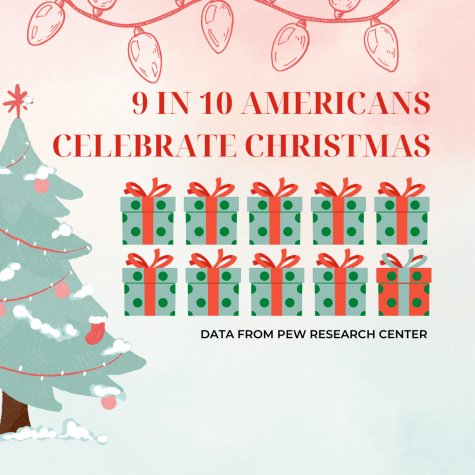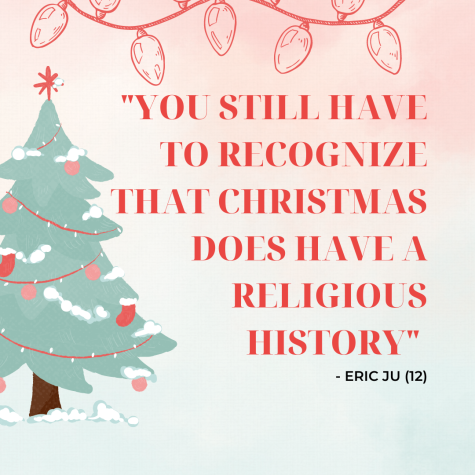Has Santa stolen Christmas from Baby Jesus?
Exploring the religious significance of Christmas to students at MVHS
Senior Aneesha Sinha places a star on the Christmas Tree, a tradition common amongst many families in America.
December 20, 2022
For as long as she can remember, senior Aneesha Sinha has woken up early on Christmas morning and driven to her grandparents’ house to celebrate with them. She and her relatives gather around the Christmas tree and open presents they bought for each other. While Christmas may not have any religious significance to her family, it’s still an important holiday to her — it has become a family tradition.
Although Christmas originated as a Christian holiday, it is now celebrated by people of many backgrounds and religions. Today, about nine in ten Americans celebrate Christmas in some shape or form. Sinha, who practices Hinduism, says Christmas is just something that she has always celebrated. She feels as though Christmas has lost a lot of religious significance, with many families, including hers, not being focused on the religious origins of the holiday.

“We just kind of have been [celebrating] since I was born. We’ve always had presents and a tree. I don’t really know how it started,” Sinha said. “My grandparents are [Hindu], and they’re OK with celebrating [Christmas], so I don’t think there’s anything wrong [with celebrating Christmas.]”
While Sinha is at home with her family around the Christmas tree, senior Eric Ju attends the Christmas morning church service at Stanford. For Ju, attending church Christmas morning is an essential part of the holiday as to him and he believes it’s an integral part of Christmas.
“Christmas is one of the biggest holidays that I celebrate,” Ju said. “It’s like partly because I grew up in church, and [Christmas] is something that they put a lot of emphasis on.”
While celebrating for religious reasons, Ju says aspects such as Christmas music offer people who aren’t Christian a way to enjoy the holiday without having to practice the religious aspects of it. Junior Naveen Karun is one of the many who look forward to listening to Christmas themed music despite not practicing Christianity as he enjoys “listen[ing] and enjoy[ing] hearing Christmas songs when they play.”
“I think that pop culture has made it much more enjoyable to celebrate Christmas because it really brings the Christmas Spirit alive,” Karun said. “I do think pop culture has become mainstream and made Christmas much more popular and widely celebrated.”
Sophomore Peter Chen disagrees — although he believes pop-culture is an important part of Christmas celebrations, he says holiday sales and shopping habits have encouraged the celebration of Christmas. He too celebrates Christmas by setting up a tree and sharing presents, however he also notices an increase in spending and shopping within his family as well as in his community.
“I don’t really think it is pop culture that popularized Christmas — I think it’s because of capitalism that companies make tons of money from holiday shopping for Christmas especially,” Chen said. “[I] notice how many companies have Christmas stuff during Novemberish, [like] the Starbucks cup.”
Ju says he has noticed the same phenomenon as Chen with the commercialization of Christmas, but he feels as though overall, it contributes positively to the holiday.
“While it does detract from the value [of Christmas], I feel like it does make [the] holiday more accessible to other people,” Ju said. “Ultimately, I feel like that’s a net positive.”
Despite not being religious, sophomore Siyona Kathuria celebrates Christmas. To Kathuria, the fun of the holiday comes from Christmas traditions such as decorating a tree, looking at Christmas lights and drinking hot chocolate with her family. However, Kathuria says that people who celebrate other holidays are not afforded the same opportunities to practice traditions. Kathuria notes that celebrating with family is often a central part of many holiday celebrations, but it requires children to take time off of school and adults time off of work.
“Children aren’t allowed to fully enjoy and celebrate the holiday if it’s not Christmas, like Hanukkah starts on [Dec. 18],” Kathuria said. “But when you have finals the whole week, you are automatically robbed of the first few days to celebrate with family since finals are the only thing on your mind.”
Indeed, many popular religious holidays such as Diwali, Hanukkah and Kwanzaa often occur at inconvenient times, as kids usually have school and adults work. The lack of inclusivity of other holidays is a problem in itself — Kathuria believes it is important that students get time off to celebrate holidays that are important to them. Kathuria says that because Christmas always falls during winter break, the time off, while not inclusive of all holidays, incentivizes families to celebrate Christmas and join in on the majority of American families already doing so, even if they don’t necessarily practice the religious aspects of Christmas.
Sinha believes that it’s also difficult for those who aren’t Christian to know about the religious roots of the holiday because of a lack of knowledge about Christianity, but she doesn’t believe that this is negative.

“I feel like not a lot of people know [that] Christmas is about the birth of Jesus Christ,” Sinha said. “I think it isn’t detracting from Christianity or anything, but I just think it kind of lost its religious significance.”
While Ju feels as though people celebrating Christmas as a non-religious holiday is a positive thing, he believes it’s important to be aware of the holiday’s religious roots.
“You still have to recognize that Christmas does have a religious history,” Ju said. “After you recognize our history, you can celebrate however you want.”



















